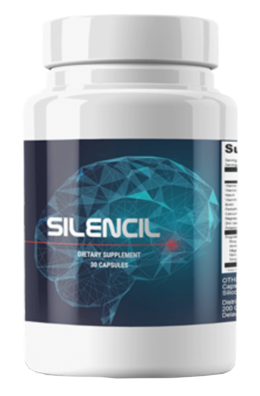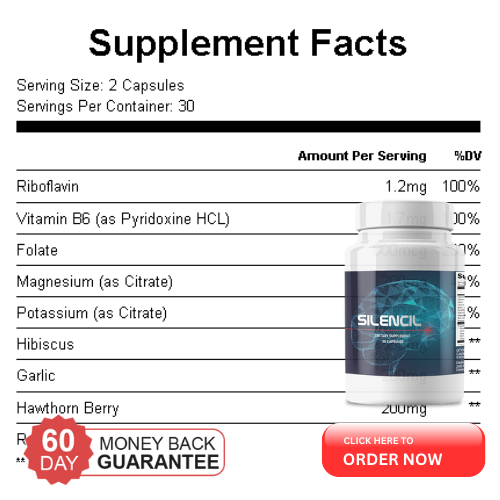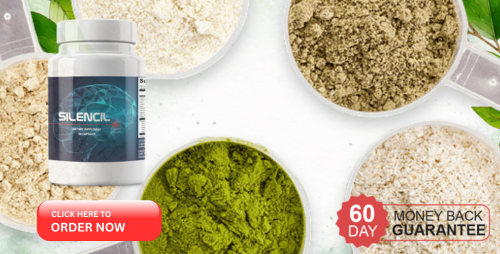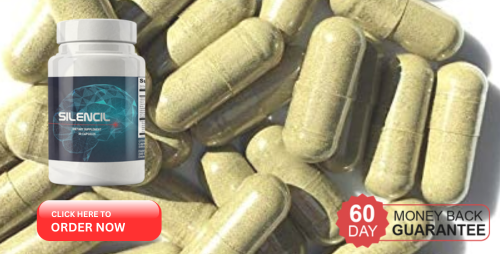Silencil Ingredients

- 100% Natural Ingredients
- Official Formula
- Made in USA
- Safe For Daily Use
- Proven Results
Silencil Ingredients Label
Silencil's tinnitus ingredients can be found on the supplements facts panel located on the back of every bottle. It displays helpful information about each of the active ingredients in Silencil, amount per serving, and percentage of daily value, all listed conveniently in order of predominance. Please refer to the ingredients label below for more information. What are the ingredients in Silencil?
Silencil Ingredients List:
- Folate: also known as Vitamin B9, is believed to potentially help manage tinnitus by contributing to the health of the nervous system and blood flow. It aids in the formation of red blood cells and helps maintain the health of the nerve cells, which can be beneficial in the prevention and management of tinnitus, especially when it's caused by poor circulation or nerve damage. Sufficient folate intake may thus contribute to overall ear health and potentially reduce tinnitus symptoms.
- Garlic: known scientifically as Allium sativum, has been long valued for its health benefits, including potential relief from tinnitus. It contains potent antioxidant and anti-inflammatory properties that may help reduce inflammation in the ear and mitigate tinnitus symptoms. Additionally, garlic is known to improve blood circulation, and good blood flow is essential for maintaining the health of the auditory system, potentially offering further benefits for tinnitus sufferers.
- Hawthorn Berry: also called Crataegus by the scientific community, this plant is often used in herbal medicine for its potential cardiovascular benefits, which can indirectly benefit those with tinnitus. It is believed to enhance cardiovascular health by improving blood flow and lowering blood pressure, two factors that can significantly influence tinnitus symptoms. By improving overall cardiovascular health, hawthorn berry may help to mitigate the intensity and frequency of tinnitus episodes.
- Hibiscus: has been used in traditional medicine for its potential to alleviate various health conditions, including tinnitus. It's thought that hibiscus may improve tinnitus symptoms due to its antioxidant and anti-inflammatory properties, which can protect the nervous system, including the auditory nerves. Additionally, hibiscus has been known to help regulate blood pressure levels, and since high blood pressure can be a contributing factor to tinnitus, managing it may help reduce tinnitus symptoms.
- Magnesium (as Citrate): is an essential mineral that plays a key role in protecting the nerves in the inner ear and maintaining healthy nerve function. There's evidence to suggest that magnesium can help reduce the occurrence or severity of tinnitus by protecting against noise-induced hearing loss, a common trigger for tinnitus. Additionally, magnesium promotes good blood flow, which is vital for the health of the auditory system.
- Potassium (as Citrate): is a vital mineral that plays a critical role in regulating fluid balance in the body, including the fluid in the inner ear, which is crucial for transmitting sound from the ear to the brain. It's thought that maintaining good potassium levels can help ensure optimal functioning of the cells that transmit these electrical signals, potentially reducing tinnitus symptoms. Therefore, sufficient intake of potassium may contribute to overall ear health and might help manage tinnitus symptoms.
- Riboflavin: also known as Vitamin B2, can be beneficial for individuals with tinnitus as it plays a vital role in cellular respiration and metabolism, processes important for the health of auditory cells. It is also an antioxidant, helping to combat oxidative stress that could damage ear structures and contribute to tinnitus. Therefore, adequate intake of riboflavin may potentially contribute to tinnitus prevention and management.
- Rosemary: Known by its scientific name Rosmarinus officinalis, this botanical contains several properties that may be of benefit to those suffering with tinnitus. Its high antioxidant content may protect auditory cells from oxidative stress, a factor that can contribute to tinnitus. Furthermore, rosemary has been recognized for its circulatory benefits, and by improving blood flow to the ear, it may help to alleviate some of the symptoms associated with tinnitus.
- Vitamin B6 (as Pyridoxine HCI): is believed to have a positive effect on tinnitus by promoting nerve health and reducing inflammation. It aids in the production of neurotransmitters, the chemicals that allow nerve cells to communicate, which can help alleviate tinnitus symptoms associated with nerve damage or dysfunction. Furthermore, its anti-inflammatory properties may help reduce the internal inflammation that can sometimes exacerbate tinnitus.
Silencil Dosage?
Each dose of Silencil is easy to incorporate into your wellness routine. Simply take two capsules once daily with a glass of water (preferably before a meal), or as directed by your healthcare provider. If you forget to take a dose of Silencil, simply take it as soon as you remember, unless it’s close to your next dose. If you're new to taking Silencil, it’s recommended to begin with the full dose of two capsules daily. Most users find that their bodies adjust to the supplement within the first week of use. Use Silencil as directed and do not exceed the recommended dose. Store Silencil in a cool, dry place, away from direct sunlight, to maintain its potency and effectiveness.
Silencil Side Effects?
Silencil is made from 100% natural ingredients and is generally considered safe for most users. It is manufactured in a facility following Current Good Manufacturing Practices (CGMP), ensuring high standards of quality and safety. To date, there have been no significant side effects widely reported by users of Silencil. However, as with any supplement, individual reactions can vary. If you have allergies to any of the ingredients in Silencil, such as garlic or rosemary extract, consult your healthcare provider before use.
Is Silencil FDA Approved?
The United States Food and Drug Administration (FDA) does not approve dietary supplements in the same way it approves prescription and over-the-counter medications. Instead, dietary supplements are regulated under a different framework, governed by the provisions of the Dietary Supplement Health and Education Act (DSHEA) of 1994. Silencil is manufactured in accordance with Current Good Manufacturing Practices (CGMP) regulations, ensuring that its identity, purity, strength, and composition meet the strict standards required of an FDA-registered facility.



